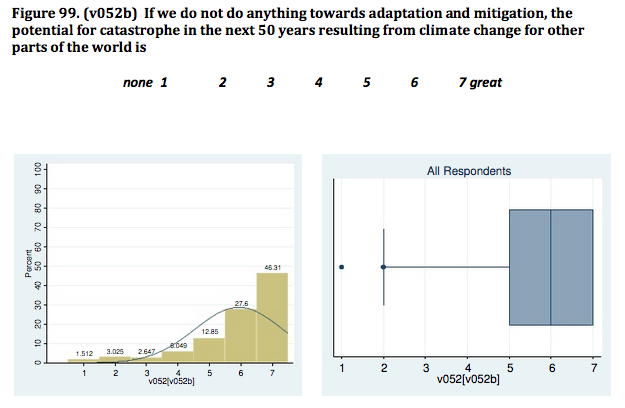This is a guest post by ClimateDenierRoundup crossposted from DailyKos
One of the first peer-reviewed surveys of scientists used to determine the level of consensus on human-made climate change was undertaken by Dennis Bran and Hans von Storch in 1996. They used a standard survey response format known as the “Likert Scale,” where respondents answer questions based on a scale of 1 to 7 to determine, for example, how confident they are that warming is happening or that it’s human-caused.
They’ve repeated the survey a few times since 1996, and have recently released the 5th International Survey of Climate Scientists, for 2015/2016. Bart Verheggen helpfully goes over the key consensus findings as well as a couple of issues with the survey.
Because of the Likert Scale response format, though, describing the findings in numbers isn’t as effective as just looking at the graphs of responses. In many cases, the responses are so lopsided that some very clear statements can be made.
We can see that, as science has progressed, the level of risk associated with climate change has increased as has what’s at stake. In contrast to folks like Judith Curry who play up uncertainty as an excuse for inaction, the majority of scientists think that since 1996, climate science uncertainty has dropped. Meanwhile, if society were to listen to voices highlighting uncertainty, and fail to act because of them, the potential for catastrophe for some parts of the world is fairly great.
To the point of the GOP AGs suggesting that Gore and others could be held responsible for exaggerating climate risks, scientists clearly think sea level rise will be just as bad as we thought five years ago, if not worse. The same can be said for other negative impacts. Over the last five years, the urgency to act on climate change has grown.
As for the public, scientists clearly think they should be told to be worried as we are already starting to experience the impacts of climate change. For example, they agree that the frequency of extreme events is increasing, as well as the intensity of those events, and the probability that those extreme events occur. Scientists expect these extreme events to become more powerful, tropical storms to get more intense, and certainly not any less frequent. Heat waves over the last 20 years are growing more intense as well as more frequent.
Most importantly, an overwhelming majority of scientists are convinced that climate change poses a serious and dangerous threat to humanity, with only 2% responding that they’re not at all convinced. Again, with the Likert scale it’s a bit difficult to put simply. Assuming a 4 out of 7 is the midway point between “not at all” concerned and “very much” concerned, 8% of respondents fell between 1 and 3, 5.667% right in the middle at 4, and 85.74% between 5 and 7.
So, deniers claiming the science is still too uncertain to take action or that the public shouldn’t be worried need to take heed of this survey (like they have in the past, if even just to spin it) and accept that they’re a fringe minority at odds with an overwhelming consensus. That’s the facts, whether they Likert or not.
Subscribe to our newsletter
Stay up to date with DeSmog news and alerts







